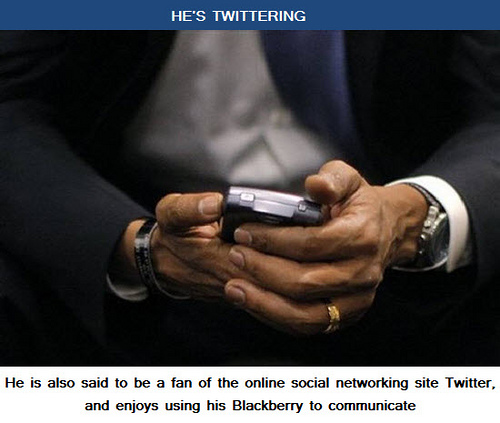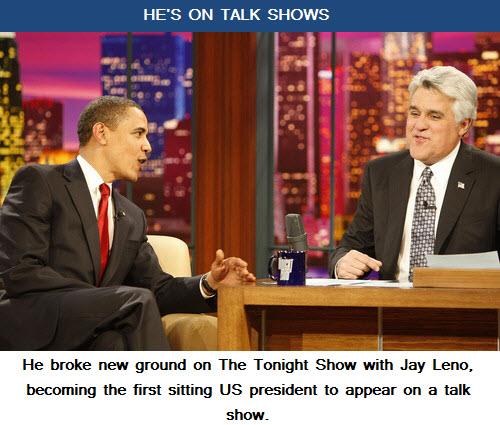 During the Great Depression in the 1930s, Mr Franklin Roosevelt’s astute use of “fireside chats” and private meetings with reporters came to redefine how future generations of US presidents viewed media strategy. Using his reassuring voice and personal charm to good effect during these encounters, FDR, as the 32nd US president is more popularity known, was said to have wielded masterly control over public opinion in those turbulent times.
During the Great Depression in the 1930s, Mr Franklin Roosevelt’s astute use of “fireside chats” and private meetings with reporters came to redefine how future generations of US presidents viewed media strategy. Using his reassuring voice and personal charm to good effect during these encounters, FDR, as the 32nd US president is more popularity known, was said to have wielded masterly control over public opinion in those turbulent times.
Current President Barack Obama appears to be gunning for similar results with a new media strategy of his own. He is making aggressive use of the Internet and social networking tools like Facebook and Twitter, and has even taken to popping up on popular talk shows to reach out to a wider audience. On Thursday, he held the first-ever “online town hall” meeting at which more than 92,000 Americans posed questions on the White House website and then watched him respond to the most popular ones via live-stream video. Official figures said some 104,000 questions were submitted and 3.6 million votes cast for the favorite queries, mostly on jobs and the economy.
But already murmurs of criticism are surfacing that the US President may be spreading himself too thin and losing his presidential “mystique” and some mainstream media have begun to critique his performance. Besides harnessing the Internet for politics, a second element of Mr Obama’s strategy acknowledges that fragmented that no single medium, or any of the traditional set pieces, such as a prime-time press conference, is enough. To make himself heard above the noise, the President has spent the past two months criss-crossing the country for town hall meetings, media interviews, and a much talked about appearance on comedian Jay Leno’s late-night talk show.

On Thursday, he raised eyebrows again by delivering a pre-recorded message for the annual “Premio Lo Nuestro” Latin music awards held in Miami, to reach out to the Hispanic community. “I want you to know that I will always be listening, and my administration is working hard so that we can expand opportunity for all Americans and reach that better day,” he said. Critics consider some of these appearances to be beneath the dignity of the country’s highest office, but analysts say they merely reflect the reality of the changing face of the US population and its media habits.

Hispanic voters are a growing force at the polls, with surveys showing that rising numbers of young viewers prefer to get their from shows like Mr Leno’s rather than traditional news programmes. The downsides to this strategy, said Mr Ken McIntyre of the conservative Heritage Foundation think-tank, is that Mr Obama may at some point come across as being “too slick for his own good”. His ubiquitous media presence could also cost him the “mystique” that Americans generally like to associate with the presidency. But for now, there is no doubt that this strategy is also taking shape against a backdrop of the mainstream media’s growing critique of his performance and ambitious agenda.
On Sunday, the New York Times ran an editorial and three pieces by its most well-read columnists, all criticizing the President’s handling of the AIG bonus controversy. AIG sparked public outrage when it paid US$165 million in bonuses to executives responsible for bringing the company to its knees. Mr Thomas Friedman bemoaned the “absence of inspirational leadership”, while colleague Maureen Dowd wondered aloud “if the wrong Obama is in (charge)”, a sarcastic reference to how the First Lady appears to be a more take-charge person than the President.
The media’s confrontational mood was again on display at Tuesday’s prime-time press conference. The reporters posed several hard-edged questions, and even appeared to anger Mr Obama at one point with their persistent questioning on the AIG issue. Professor Martha Kumar, who has studied White House relations with the press since 1975, said the media criticisms were not unexpected given the tough decisions Mr Obama has faced so early in his presidency.
“Taking action means making choices, and when you make choices, you are going to create critics in addition to allies,” she told the Straits Times. Prof Kumar added, however, that the President would still depend on news organizations as a “basic link” between his administration and the public. Mr Obama has given all indication, however, that this will be only one of many links he will use. At a fund-raiser on Wednesday night, he said: “It’s easy to get caught up in the day-to-day cable chatter. You know, one day I’m a genius, one day I’m a bum. That’s not how we measure success.”
Â
Article written by CHUA CHIN HON, US BUREAU CHIEF, the Straits Times